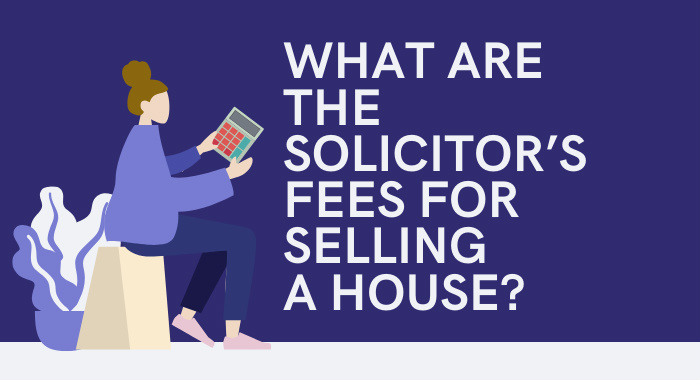Buying a home is said to be one of life’s most stressful experiences, but while the process is easier for a home seller, there are still issues to deal with and there are solicitor’s fees to pay for selling your house.
Whether you’re selling a flat or a large detached property, you will still need to pay these fees.
And it’s essential that this work is done by professionals, and you should hire a solicitor or a specialist conveyancing firm to do this work on your behalf.
Fortunately, conveyancing is a competitive part of the home buying and selling process, so if you shop around you can often find a good deal. This is what we did when we sold our house, so we’ll be going into what solicitor’s fees for selling a house we had to pay shortly…
Solicitor’s fees for selling a house at a glance
| Fees | Price Range | Comments |
|---|---|---|
| Conveyancing Fees (Freehold) | £800 - £1,600 | Most solicitors/conveyancers will charge a fixed fee for these standard charges. They include the standard services. However, they will depend on the value of the house you sell. |
| Conveyancing Fees (Leasehold) | £900 - £1,800 | Standard charges that include standard services. The higher the value of the property you sell the higher the fees. |
| Anti Laundering Checks | £5 | These checks are required and will be done by every solicitor or conveyancer. |
| Bank Transfer Fees | £25 - £45 | These fees need to be paid to the bank for transferring the money to you or your mortgage lender. It will vary depending on which bank is used. |
| Mortgaged Property Supplement Fee | £220 | This fee only needs to be paid if you have a mortgage on the property you sell. |
| Copy Of Title Rgister | £6 | This is needed so that the solicitor has proof that you own the house you are selling. |
| Extra Costs | £100 - £1,000 | Depending on the circumstances, there might be extra costs, such as for indemnity insurance or shared ownership. |
Solicitor’s fees explained in detail

As with everything when it comes to buying and selling homes, how much you pay a solicitor when selling a house will vary.
It will depend on the value of the house you are selling, but also on how complicated a sale it is. There will also be a price difference between selling a leasehold or freehold property.
On average, you can expect to pay between £1,000 and £2,800 for selling a freehold property. The average solicitor’s fees for selling a leasehold property are between £1,200 and £3,000. [All prices correct in January 2024]
The solicitor or conveyancer costs consist of the following parts:
Legal fees
These are the fees that will cover the work that needs to be done as part of the conveyancing process. Most solicitors and conveyancers charge a fixed fee for these services, although some might charge per hour.
The fees depend on the value of the property you sell: the higher the value, the higher the fees. The legal fees include all the standard services necessary for the conveyancing process. These include:
- The transfer of deeds
- Title deeds
- The sale agreement
- Deal with buyer enquiries
- The property information form
- The draft contract of sale
- Contract signing
- The exchange of contracts
- They will receive the deposit
- Take care of the money transfer for you
On average, you can expect to pay between £800 and £1,600 in legal fees for selling a freehold property. For a leasehold property these legal fees will range from £900 to £1,800.
There is also a difference in price between the services of a solicitor and a conveyancer. Conveyancer will handle the conveyancing process, while solicitors do the same but will also provide legal advice.
So using a conveyancer will be cheaper and for an uncomplicated sale, this might be all that is needed. There are also online conveyancing firms you can use and which are cheaper, but you will need to ensure that all the paperwork is done correctly.
We personally have always used a conveyancing solicitor because we wanted to get the legal advice as well. It’s a question of money but also of preference. We feel that using an experienced solicitor will give us peace of mind and reduce the stress levels.
Disbursements

These are costs that occur during the conveyancing process and are charged by third parties. The solicitor or conveyancer will pay them on your behalf and invoice you for the costs.
They include costs for a copy of the title register to prove that you own your house. The fees are charged by Land Registry. Bank transfers and money laundering checks also incur costs.
If you still have a mortgage to repay, there are further charges that might come up. Some of these disbursements might be included in the legal fees with some solicitors.
It’s difficult to say how much these disbursements will be because they depend on the individual circumstances of the sale. But on average you should expect between £51 and £300.
Additional costs
Depending on the complexity of the sales, there might also be additional costs, such as indemnity insurance if you have an extension that was built without planning permission.
If you have to remortgage or are porting your mortgage you will have to pay additional costs too, which the solicitor will pay on your behalf and then invoice you.
It’s hard to estimate how high these additional costs might be, but they could range from £100 to £1,000.
As you can see, solicitor’s fees for selling a house can be quite hefty, especially if your home has a high value. But selling a house is cheaper than buying one when it comes to legal costs. That’s because there is more work involved for the solicitor during the buying process.
When we bought our current home in 2021 we paid the following fees:
- Conveyancing For Sale = £1,542
- Conveyancing For Purchase = £2,118
- Legal Search Pack = £350
- Land Registry Fees = £141
- Anti-Money Laundering Checks = £24
- Other Admin Fees = £13
Grand Total (Buying & Selling) = £4,188
If we had just been selling, the fees would have amounted to around £1,600.
That means we paid much more to buy our new property than we did to sell our old one. That’s mostly down to the extra work involved when buying as our solicitor had to check everything was in order with the new house before we could proceed.
Get a conveyancing solicitor quote:
Solicitors will charge for any work undertaken

Solicitor’s fees for selling a house could potentially be quite high, so you might wonder if there is such a thing as no sale, no fee option. Or will solicitors charge if the house sale falls through?
Unlike estate agents, who might offer this option, a solicitor won’t. Since a solicitor is engaged to carry out work and will have started the process, then it’s likely you will be charged for their time and effort regardless of whether your sale transaction completes.
You will certainly be handed a bill for the cost of disbursements and other regulatory fees they have racked up.
That’s not the case for the estate agent, who only gets paid once the transaction is complete, and they collect their commission from the sale.
It’s likely you will not have to pay the full agreed amount to a solicitor because they will not have completed all the relevant work. If they have, then yes, you will need to pay for the solicitor’s bill, even though your house transaction has fallen through.
This is also the point to highlight that you will have signed a legal and binding contract with the conveyancing solicitor, known as the terms of business with an estimate of the fees and what would happen if a house purchase did not complete.
Depending on when the house sale falls through, the solicitor may have done lots of work on your behalf and claim this amount, or they may charge you 70% to 80% of the fees that were originally quoted.
Selling A Property? FREE Step-By-Step Platform
Companies offering cheap conveyancing fees for selling your house
Given the potential high costs, you might be looking for a way to reduce them. An internet search might lead you to companies offering cheap conveyancing fees.
However, you will need to check the small print to ensure that there are no hidden charges or costs that you will have to pay.
That’s because some conveyancers or websites may charge for things that should really be covered in the basic sales fee as they add these as extras on their invoice or categorise them under disbursements.
This means that they will essentially offer a cheap conveyancing service for selling a home, but bump up their fees with so-called disbursements, whereas a more trustworthy conveyancing firm will make clear these charges when they take you on as a client.
There are conveyancing comparison websites available, and if you want to agree to a conveyancing fee without any extras, this is known as a fixed fee conveyancing service.

There are a number of issues that affect the fees being charged when selling a property and these include:
- Property tenure: Whether your property is freehold or a leasehold property may have an impact on the costs being quoted;
- Shared ownership schemes: Should there be a shared ownership scheme involved in your house sale, then this may push up the charges to deal with the complexities involved and also the additional paperwork;
- Mortgage redemption: Some solicitors may charge extra fees should there be a mortgage settlement involved when selling your house.
If any of these apply to your house sale, you might want to check if a fixed fee conveyancing service will include fees or if you have to pay extra.
Our top tips for solicitor’s fees for selling a house
To sum up, these top tips will prove helpful when searching for solicitor’s fees to sell a house, and they include:
- Choose the right solicitor for a stress-free and successful transaction
- Be wary of any conveyancing firm offering a too cheap price
- Or is too expensive
- You don’t have to use a solicitor or conveyancer recommended by your estate agent
- Always, always shop around for the best deal





